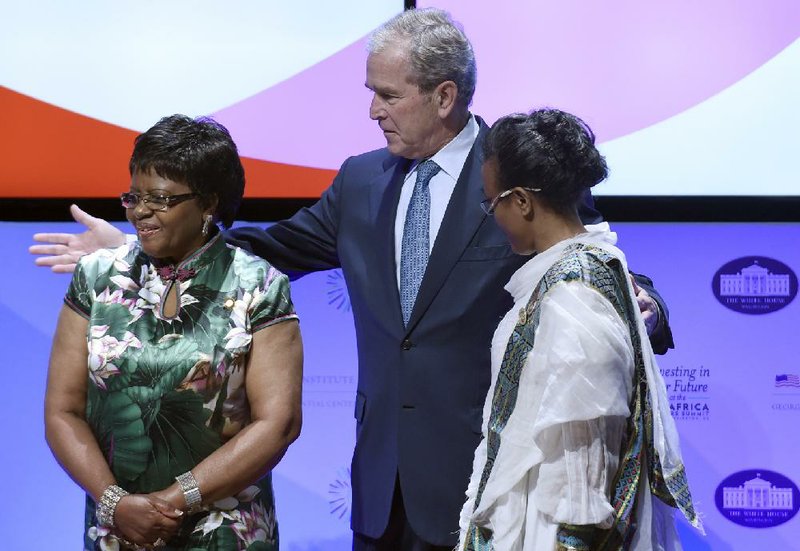WASHINGTON -- President Barack Obama on Wednesday heralded Africa as a continent on the rise and a growth market for U.S. businesses as he closed a summit with African leaders.
The summit also marked a return to Washington for former President George W. Bush, who launched a $15 billion HIV/AIDS initiative while in office and has made public health issues in Africa a priority since leaving the White House. Bush and first lady Michelle Obama hosted a day-long event for spouses of the African leaders.
The former president promoted a new chapter in the battle with AIDS, saying at this stage the effort can be focused with better data, better treatment options and better prevention approaches to "reach and help the highest-risk regions and groups."
"Applied with clear goals and accountability, this saturation approach presents an amazing opportunity -- the beginning of the end of AIDS," Bush said at the gathering, held at the Kennedy Center.
While Obama has continued Bush's signature AIDS program, he has also been seeking his own legacy-building Africa initiatives. This week's U.S.-Africa summit, which gathered leaders from more than 50 African nations, was seen as a cornerstone of that effort, and Obama pledged to make the gathering a recurring event.
"Africa must know that they will always have a strong and reliable partner in the United States of America," Obama said at a news conference marking the end of the three-day summit.
Much of the summit focused on boosting U.S. business ties with Africa, which is home to six of the world's 10 fastest-growing economies and a rapidly expanding middle class.
But the final day of discussions underscored the challenges that could undermine that economic growth. Health crises remain among Africa's most pressing problems, including the current outbreak of the deadly Ebola virus in West Africa.
Obama acknowledged that the public health systems in affected countries have been overwhelmed by the outbreak and said the U.S. was encouraging them to focus their efforts on rapidly identifying and isolating patients.
The president also pledged to expand security cooperation with African nations to address threats from terrorism and human trafficking, alluding to U.S. concerns that extremism in North Africa and the Sahel could destabilize the already volatile region.
"The entire world has a stake in peacekeeping in Africa," Obama said.
Before taking questions from reporters, Obama convened a session with African leaders on good governance, universal rights and the strengthening of civil societies. And he defended U.S. engagement with countries that have problematic records on those fronts, arguing that America's involvement can help nations do better.
"We find that in some cases, engaging a country that generally is a good partner but is not performing optimally when it comes to all the various categories of human rights, that we can be effective in working with them on certain areas and criticizing them and trying to elicit improvements in other areas," Obama said.
As Obama participated in summit meetings, his wife convened a gathering of African first ladies, talking about investments in education, health and economic development. She was joined by Laura Bush, reprising an event the two American first ladies held last summer in Tanzania.
Michelle Obama and Laura Bush focused on the need to educate girls, noting that 30 million girls in sub-Saharan Africa do not attend school.
George Bush also gave his endorsement for efforts to support women in Africa, saying, "Taking care of women is good politics."
He announced that a global health partnership that screened more than 100,000 women in Botswana, Tanzania and Zambia for cervical cancer in the past three years was expanding into Namibia and Ethiopia.
The effort is part of Bush's "Pink Ribbon Red Ribbon" women's health initiative that has been his focus after his presidency.
Bush said ignorance, misinformation and stigmatization were obstacles to public health that should be overcome, mentioning specifically what he called "false rumors about the HPV vaccine," intended to guard against cervical cancer.
"People die from stigma," he added. "While stigma may seem like a high, unbreachable wall, you've got to realize it's made of glass. It can be broken."
Information for this article was contributed by Julie Pace, Darlene Superville and Josh Lederman of The Associated Press and by Peter Baker of The New York Times.
A Section on 08/07/2014

